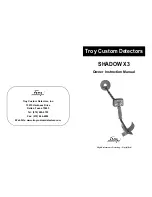
5
ASSEMBLY
(
continued)
IN THE FIELD TECHNIQUES
(
continued)
Armrest Strap
(not included)
Some users prefer to use a
strap when swinging the
detector vigorously, in order
to hold the detector secure
against the arm. The strap
may be purchased as an
optional accessory.
The detector can also be used
without the strap with no
compromise to detector
balance and stability under
most conditions.
Swing the searchcoil slowly,
overlapping each sweep as you move
forward. It is important to sweep the
coil at a consistent speed over the
ground as you search. After
identifying a target, your sweep
technique can help in identifying both
the location and the nature of the
target. If you encounter a weak
signal, try moving the coil in short,
rapid sweeps over the target zone;
such a short rapid sweep may
provide a more consistent target
identification.
Most worthwhile objects will
respond with a repeatable tone. If the
signal does not repeat after sweeping
the coil directly over the suspected
target a few times, it is more than
likely trash metal.
Crossing the target zone with
multiple intersecting sweeps at
multiple angles is another way to
verify the repeatability of the signal,
and the potential of the buried target.
To use this method, walk around the
target area in a circle, sweeping the
coil across the target repeatedly, every
30 to 40 degrees of the circle, about
ten different angles as you walk
completely around the target. If a
high-tone target completely
disappears from detection at a given
angle, chances are that you are
detecting oxidized ferrous metals,
rather than a silver or copper object.
If the tone changes at different angles,
you may have encountered multiple
objects. If you are new to the hobby,
you may want to dig all targets at first.
With practice in the field, you will
learn to better discern the nature of
buried objects by the nature of the
detector’s response.
You may encounter some false
signals as you proceed. False signals
occur when the detector beeps, but
no metal target is present. False
signals can be induced by
electromagnetic interference,
oxidation, or highly mineralized
ground soils. If the detector beeps
once, but does not repeat the signal
with several additional sweeps over
the same spot, there is probably no
target present.
When searching very trashy ground,
it is best to scan small areas with
slow, short sweeps. You will be
surprised just how much trash metal
and foil you will find in some areas.
The trashiest areas have been
frequented by the most people, and
frequently hold the most promise for
finding the most lost valuables.
Also maintain the searchcoil
positioned just above the surface of
the ground, without making contact
with the ground. Making contact with
the ground can cause false signals.
WHAT
READS
LIKE THIS
…MAY
ACTUALLY
BE THIS
16
Battery
Compartment
(back side)
Searchcoil
Knurled
Knob
Hand-grip
Nut
Screw
Searchcoil
Cable
Cable
Plug
S-Rod
armrest
Velcro
Strap
Locking
Collar
Locking
Collar
Upper
Stem
1/4” Headphone Jack
Optional Arm Strap





































